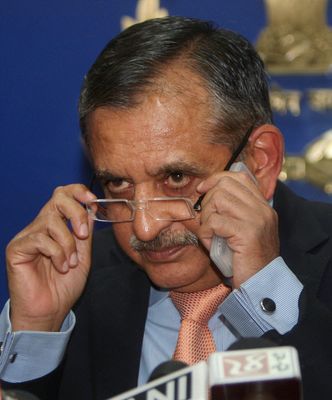 A.P. Singh | PTI
A.P. Singh | PTI
Former CBI director A.P. Singh explains why the agency filed a closure report even before the Talwars were put on trial. For him, it was a “botched up” case from the day the agency began the probe. Excerpts from an interview:
What were your first thoughts when the Allahabad High Court acquitted the Talwars?
The Allahabad High Court has given the dentist couple the benefit of the doubt. This is exactly what we had said in the beginning; that there were gaps in the investigation. There was insufficient evidence to prosecute them. I was not involved in the investigation of the case. But, when I came to the CBI in 2010, I reviewed the case and called both the CBI teams which had investigated it. We discussed every aspect of the case. I saw there wasn’t enough evidence to prosecute the Talwars, and whatever evidence we had, we put it in the court. But the court said that they should go on trial and charges would be framed. That’s how the Talwars got convicted. Now, they have got the benefit of the doubt, for lack of evidence.
Is it a vindication of the CBI’s stand?
In a way, yes. It is a vindication of our stand. We had said there were gaps in the investigation. The court has said the same thing now. The CBI will not charge sheet without evidence. Even if we were sure about the accused, we did not have clinching evidence.
When did the evidence get lost or destroyed?
The evidence was lost and destroyed mostly at the initial stage. The scene of crime had been botched up. When the Uttar Pradesh policemen went to the Talwars’ residence soon after the crime was discovered, the family told them that Hemraj [the domestic help] had murdered their daughter and they should find him rather than remaining at the residence. The police then went helter-skelter looking for him. The case got messed up at that stage. When the CBI came after 15 days, there was nothing left of evidence.
How did the CBI investigate the case?
We were working under very difficult circumstances. This was a case where there were no eyewitnesses and no weapons of offence recovered from the scene of crime. So we were working on circumstantial evidence only. One year later, Rajesh Talwar gave us his golf club, which was allegedly the weapon of offence. But we did not find any bloodstains on it, so we could not connect it with the murder.
How did the parents come under suspicion?
It was more of a negative evidence we were working upon. For lack of any positive corroborative evidence, the team started ruling out certain aspects. They ruled out that it was an outsider’s job; then they ruled out that the servants were the perpetrators of the crime. So, when four people are in a house and two of them are found dead, the other two will be asked to explain what happened. So it was more of a negative evidence against them.
The case has generated huge public sentiment. Were you under pressure at any stage?
Just like the courts, we cannot go by public sentiment. We only have to look at the evidence in hand. So when I came to the CBI, the case had already been investigated and I only had to decide the next step. Based on the merits of the case, I decided that a closure report may be filed. That is a call one has to take. I don’t know about pressures, but at least no one approached me.
Does it mean that when it is a blind case, it is impossible to find the culprits?
No. Investigating agencies like the CBI have probed many blind cases successfully. We did some good investigations like the Shehla Masood murder case. It was a blind case, but we were able to zero down on the lady architect Zahida Pervez who had hired a contract killer and had the RTI activist murdered. We were able to crack the case. In January this year, a CBI court sentenced the accused to life imprisonment. Then there was the Bhanvari Devi case of Rajasthan, where some minister was involved. So it is not as if the CBI does not do good investigations.




